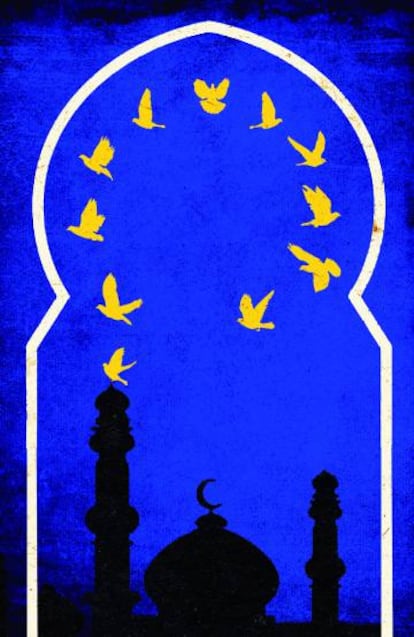European Muslims
We must not succumb to the temptation of scapegoating Muslims for Europe’s moral and political crisis, nor fall into the trap of permanent confrontation, the basis of Islamophobia

As recently as a decade ago, there was little place for racism and xenophobia in Europe; now they both seem very much at home. And the 21 million Muslims who live in Europe, both individually as well as collectively, are the scapegoat nearest to hand. The rise of Islamophobia suggests that the European principles of freedom, equality and solidarity were never more than words. That’s to say, Europe’s crisis is above all a crisis of principles.
The inclusive legislation that at one time characterized the EU is now being undermined at an alarming rate by a series of political and legal initiatives to segregate Muslims from the rest of society, effectively discriminating against Islam as a religion.
At the same time, widespread xenophobia provides some consolation to the growing number of people disgusted with an EU where one in four people is now at risk of marginalization, while at the same time threatening the social progress that its largely symbolic legitimacy has been built on. The outcome is that for too many Europeans, Europe is less white, less Christian, and less middle class. A culprit has to be found.
Europe’s relationship with Islam has changed a lot since Lawrence of Arabia was able, a century ago, to justify Britain breaking its promise of giving the Arabs independence by saying “Maktub!” (“it is written”). During the colonial era, Islam was used as an excuse to reduce Muslims to the role of subordinates in need of European enlightenment. Today Islam is part of the European reality and European Muslims are the masters of their history in just the same way other Europeans are. This is a radical change, and one that for many Muslims has proved traumatic to assimilate.
Not even London’s new mayor, Sadiq Khan, who among other things is a Muslim, has been spared scrutiny
The disproportionate attention the public gives to European Muslims’ religious identities means that the latter are continually having to define themselves in defensive terms: jihadism, the burka and immigration are the latest threats to a pax europaea, which at this point in time seems largely inexistent. Even teenagers, under the weight of inquisitions from school friends and teachers, are beginning to see themselves as dangerous Muslims. And woe betide any Muslim who tries to abstain from the debate: impossible, because a Muslim is always a Muslim!
The reason for the suspicion that hangs over Muslims are policies by our governments that keep the community, and in particular, young Muslims, under permanent scrutiny while the rest of the population tries to avoid contact with them at all cost.
In France, the government’s latest move in its “war against terrorism, jihadism, and radical Islam” consists of locking up “radical” young people in specially created rehabilitation centers. Quite how the term radical is to be interpreted hasn’t been explained.
Meanwhile, in Spain, mere suspicion of “having begun a radicalization process” is on the way to entering the statute books as a crime. At the end of last year, the Interior Ministry set up a service to allow people to anonymously identify suspected radicals.
Not even London’s new mayor, Sadiq Khan, who among other things is a Muslim, has been spared scrutiny. During the election campaign, his Conservative Party rival Zac Goldsmith used Khan’s religion to question his patriotism, while nobody would have questioned Goldsmith’s patriotism because he is a Jew. Khan’s message during and after the campaign was one of conciliation.
What Muslims want from Europe is basically bread, freedom, and social justice
Europe and its Muslims are in the same boat. The Muslim community has much at stake, but so does Europe. The European project, based on equality, also depends on its attitude toward Muslims here. The xenophobic rhetoric of nationalist parties on the rise, keen to garner votes, threatens the principles of the EU. Its Islamophobia is open, explicit and arrogant.
The worst exponent of this trend is Geert Wilders, leader of the Dutch Freedom Party, which compares the Quran with Adolf Hitler’s Mein Kampf and calls for it to be banned. But there is an even more dangerous type of Islamophobia that is weakening the foundations of an integrated Europe. This is a more subtle Islamophobia based on seemingly enlightened principles and arguments, one never made explicit, although it occasionally lets its discriminatory veil slip. The French Prime Minister, Manuel Valls, is a master of this approach. He distinguishes between what he calls the Islamic fascism of some groups (which at the moment are the Muslim Brotherhood and ISIS) and a more agreeable Islam, one that is largely invisible. Can we imagine anybody daring to talk about Christian fascism or Judeo fascism, or Buddhist fascism? There is no shortage of examples of countries where all the major religions have been involved in violence in recent years, and neither is there of its role in providing an ethics of compromise and human dignity.
Reducing things to the level of a confrontation between European Muslims and the rest of the population is the core of the Islamophobic project. Making Muslims outsiders, putting them on the defensive and attributing obscure objectives to take over the world is far from accidental. What Muslims want from Europe is basically bread, freedom, and social justice; which is pretty much what everybody else wants, sick and tired as we are of the supremacy of the markets and seeing our sovereignty undermined.
Brexit has wiped the smile off the faces of our elites. The response on the part of our leaders has always been to sweep the dirt under the carpet, but such is the legitimate anger of British fishermen, workers and shopkeepers, that Brexit may well set off a chain reaction across the English Channel.
A growing number of people in the Netherlands already talk openly about Nexit. While in Spain, recent elections have shown us to be a more nationalist and less self-critical country than we imagined. Trying to address these issues with late-empire populism in the case of Britain, or clumsy manipulation in the case of Spain, will solve nothing. And neither will yielding to the ever-present temptation to make Europe’s Muslims the scapegoat for the political and moral crisis Europe is living through. The problem is simple: Europe itself is absent.
Luz Gómez is professor of Arabic and Islamic Studies at the Autonomous University of Madrid.
English version by Nick Lyne.
Tu suscripción se está usando en otro dispositivo
¿Quieres añadir otro usuario a tu suscripción?
Si continúas leyendo en este dispositivo, no se podrá leer en el otro.
FlechaTu suscripción se está usando en otro dispositivo y solo puedes acceder a EL PAÍS desde un dispositivo a la vez.
Si quieres compartir tu cuenta, cambia tu suscripción a la modalidad Premium, así podrás añadir otro usuario. Cada uno accederá con su propia cuenta de email, lo que os permitirá personalizar vuestra experiencia en EL PAÍS.
¿Tienes una suscripción de empresa? Accede aquí para contratar más cuentas.
En el caso de no saber quién está usando tu cuenta, te recomendamos cambiar tu contraseña aquí.
Si decides continuar compartiendo tu cuenta, este mensaje se mostrará en tu dispositivo y en el de la otra persona que está usando tu cuenta de forma indefinida, afectando a tu experiencia de lectura. Puedes consultar aquí los términos y condiciones de la suscripción digital.









































